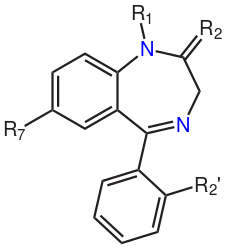
The molecule above is the core structure of the most common pharmacologically active benzodiazepines. (Credit: Wikimedia Commons)
A randomized, controlled trial of 303 seniors from Quebec found that a simple intervention resulted in 27% of them becoming sleeping-pill free. The study emphasizes the importance of seniors being active and able participants in decisions about their health care.
The researchers used a handout describing the risks of sleeping pill use and encouraging the patients to speak with their doctors. Non-essential medicines – for example, sleeping pills like benzodiazepine – are not recommended for seniors as they can conflict with other medications, yet many continue taking them.
Original research paper published in the Journal of the American Medical Association – Internal Medicine on April 14, 2014.
Names and affiliations of selected authors

